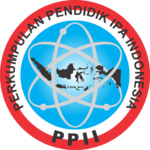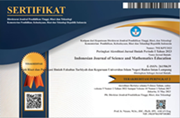Mathematical Communication Skills in Solving Limit and Continuity Problems: Reviewed from Intra-and-Interpersonal Intelligence
Abstract
Keywords
Full Text:
PDFReferences
D. W. De Long and L. Fahey, “Diagnosing cultural barriers to knowledge management,” Acad. Manag. Perspect., vol. 14, no. 4, pp. 113–127, 2000.
N. Mercer, “The social brain, language, and goal-directed collective thinking: A social conception of cognition and its implications for understanding how we think, teach, and learn,” Educ. Psychol., vol. 48, no. 3, pp. 148–168, 2013.
A. Almanthari, S. Maulina, and S. Bruce, “Secondary School Mathematics Teachers’ Views on E-learning Implementation Barriers during the COVID-19 Pandemic: The Case of Indonesia,” Eurasia J. Math. Sci. Technol. Educ., vol. 16, no. 7, p. em1860, 2020.
K. T. Knake, Z. Chen, X. Yang, and J. Tait, “Pinterest curation and student achievement: The effects of elementary mathematics resources on students’ learning over time,” Elem. Sch. J., vol. 122, no. 1, pp. 57–85, 2021.
K. H. L. G. M. Z. Atsani, “Transformasi media pembelajaran pada masa Pandemi COVID-19,” Al-Hikmah J. Stud. Islam, vol. 1, no. 1, pp. 82–93, 2020.
U. H. Salsabila, S. N. Utami, A. Zahra, F. Haikal, and A. Cahyono, “Pengaruh Penggunaan Media Belajar Online Selama Pandemi,” J. Ilm. Wahana Pendidik., vol. 7, no. 1, pp. 1–9, 2021.
T. Laurens, F. A. Batlolona, J. R. Batlolona, and M. Leasa, “How does realistic mathematics education (RME) improve students’ mathematics cognitive achievement?,” Eurasia J. Math. Sci. Technol. Educ., vol. 14, no. 2, pp. 569–578, 2017.
P. M. Usman, “Pendekatan Kontekstual Pada Kemampuan Penalaran Matematika Di Kabupaten Banggai,” Dikmas J. Pengabdi. Masy., vol. 1, no. 3, pp. 107–110, 2021.
NCTM, Principles, and Standards for School Mathematics. Reston, VA: The National Council of Teachers of Mathematics, Inc., 2000.
N. K. N. Mahadewi, I. M. Ardana, and N. M. S. Mertasari, “Kemampuan Komunikasi Matematis Melalui Model Reciprocal Teaching Berbantuan Media Interaktif,” JNPM (Jurnal Nas. Pendidik. Mat., vol. 4, no. 2, pp. 338–350, 2020.
OECD, “PISA 2018 Mathematics Framework,” in PISA 2018 Assessment and Analytical Framework, Paris: OECD Publishing, 2019, pp. 73–95.
A. Rausch, “Complexity, Accuracy, Fluency as a Communication Paradigm: From Theory to Instructional Curriculum,” Japanese J. Commun. Stud., vol. 45, no. 2, pp. 115–127, 2017.
A. Wicaksono, “Profil Pemecahan Masalah Matematika Siswa SMP Dengan Kecerdasan Interpersonal Ditinjau Berdasarkan Gender,” Koord. J. Pembelajaran Mat. Dan Sains, vol. 1, no. 1, pp. 39–51, 2020.
M. Lwin, A. Khoo, K. Lyen, and C. Sim, “How to multiply your child’s intelligence: a practical guide for parents of seven-year-olds and below.” Pearson Education Asia Pte., Ltd, Singapore, 2002.
K. T. Habeeb, “Dimension-wise analysis of social intelligence and suggestions to enhance social skills in adolescents,” Int. J. Reflective Res. Soc. Sci., vol. 2, no. 2, pp. 4–7, 2019.
A. S. D. Dwiyana, “Pemecahan masalah, komunikasi matematis, kecerdasan intrapersonal dan interpersonal melalui pembelajaran problem posing.” PERPUSTAKAAN PASCASARJANA, 2020.
M. N. O. Sadiku and S. M. Musa, “Intrapersonal Intelligence,” in A Primer on Multiple Intelligences, Springer, 2021, pp. 95–106.
M. Abas and E. Solihatin, “Effect of Instructional Models and Interpersonal Intelligence on the Social Studies Learning Outcomes.,” Int. J. Instr., vol. 12, no. 4, pp. 705–718, 2019.
E. Mastoni, M. S. Sumantri, and N. Ibrahim, “A Preliminary Study of Brain-Based Learning (BBL) and Intrapersonal Intelligence in Junior High School Mathematics Learning,” Univers. J. Educ. Res., vol. 7, no. 9A, pp. 147–154, 2019.
A. L. Hidayat, “Pengaruh Intrapersonal Intelligence Terhadap Kemampuan Komunikasi Matematis Siswa Kelas VII SMP NU Sabilil Huda Kab. Kediri,” 2021.
I. N. U. R. Rosyidah, “Pengaruh Kecerdasan Interpersonal Terhadap Kepercayaan Diri Siswa MTSN 1 Kota Blitar,” 2018.
Imroatusolikhah, “Hubungan kecerdasan interpersonal dan kecerdasan intrapersonal terhadap hasil belajar matematika siswa kelas VIII MTs Ma’arif Kencong/Imroatusolikhah,” Skripsi, Jur. Mat. Fak. Mat. dan Ilmu Pengetah. Alam, Univ. Negeri Malang, 2016.
C. Maitrianti, “Hubungan antara kecerdasan intrapersonal dengan kecerdasan emosional,” J. MUDARRISUNA Media Kaji. Pendidik. Agama Islam, vol. 11, no. 2, pp. 291–305, 2021.
S. Rohmah and A. Rinaldi, “Analisis Kemampuan Komunikasi Matematis: Dampak Kecerdasan Emosional Pada Materi Operasi Hitung Aljabar,” in Prosiding Seminar Nasional Matematika dan Pendidikan Matematika, 2019, vol. 2, no. 1, pp. 199–210.
P. M. Laksananti and S. Setiawani, “Analisis Kemampuan Komunikasi Matematis dalam Menyelesaikan Masalah Pokok Bahasan Bangun Datar Segi Empat ditinjau dari Kecerdasan Emosional Siswa Kelas VIII-D SMP Negeri 1 Sumbermalang,” Kadikma, vol. 8, no. 1, pp. 88–96, 2017.
J. Miles, M.B. Huberman, A.M., & Saldana, Qualitative Data Analysis: A Methods Sourcebook. Arizona State University, United States: Sage Publication, Inc., 2014.
A. A. Putrawan and I. G. P. Suharta, “Pengembangan perangkat pembelajaran matematika dengan pendekatan scientific berbantuan geogebra dalam upaya meningkatkan keterampilan komunikasi dan aktivitas belajar matematika siswa kelas VIII SMP,” J. Pendidik. dan Pembelajaran Mat. Indones., vol. 3, no. 1, 2014.
T. S. Wahyuni, R. Amelia, and R. Maya, “Analisis kemampuan komunikasi matematis siswa SMP pada materi segiempat dan segitiga,” J. Kaji. Pembelajaran Mat., vol. 3, no. 1, pp. 18–23, 2019.
Z. H. Iksan et al., “Communication skills among university students,” Procedia-Social Behav. Sci., vol. 59, pp. 71–76, 2012.
M. S. Applebee, A. P. Johanson, K. A. Lawler-Sagarin, E. N. Losey, and C. Munro-Leighton, “The Three-Minute Slide as an effective tool for developing oral communication skills,” J. Chem. Educ., vol. 95, no. 8, pp. 1419–1422, 2018.
B. K. Costigan RD, “Developing Listening and Oral Expression Skills: Pillars of Influential Oral Communication,” J. Manag. Educ., vol. 44, no. 2, pp. 129–164, 2020.
H. Jannah, A. H. Fathani, and A. Fuady, “Profil kemampuan komunikasi matematis ditinjau dari kecerdasan interpersonal dan intrapersonal peserta didik,” J. Penelitian, Pendidikan, dan Pembelajaran, vol. 16, no. 30, 2022.
U. Nisa and R. Setianingsih, “Kemampuan Komunikasi Matematis Siswa Dalam Menyelesaikan Soal Statistika Ditinjau Dari Kecerdasan Intrapersonal dan Interpersonal,” J. Penelit. Pendidik. Mat. Dan Sains, vol. 3, no. 2, pp. 89–100, 2019.
L. F. Utami, I. Pramudya, and I. Slamet, “Students’ Mathematical Communication Skills in Terms of Concrete and Abstract Sequential Thinking Styles,” Al-Jabar J. Pendidik. Mat., vol. 11, no. 2, pp. 371–381, 2020.
U. Mulbar, F. Arwandi, and S. F. Assagaf, “The Influences of Intrapersonal Intelligence and Interpersonal Intelligence towards Students’ Mathematics Learning Outcomes,” Adv. Soc. Sci. Educ. Humanit. Res., vol. 277, pp. 219–221, 2019.
A. A. Putra and M. Subhan, “Mathematics learning instructional development based on discovery learning for students with intrapersonal and interpersonal intelligence (preliminary research stage),” Int. Electron. J. Math. Educ., vol. 13, no. 3, pp. 97–101, 2018.
DOI: http://dx.doi.org/10.24042/ijsme.v5i1.10680
Refbacks
- There are currently no refbacks.
Copyright (c) 2022 Unit Riset dan Publikasi Ilmiah FTK UIN Raden Intan Lampung

This work is licensed under a Creative Commons Attribution-ShareAlike 4.0 International License.

Indonesian Journal of Science and Mathematics Education is licensed under a Creative Commons Attribution-ShareAlike 4.0 International License.





